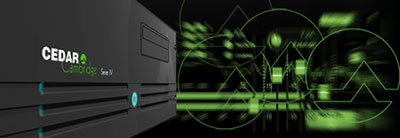What's new in CEDAR Cambridge Version 10

CEDAR Cambridge V10™ is the latest revision of our acclaimed system. It boasts many new features and tools for restoring vast quantities of audio for broadcasters, archives and libraries, for homing in on the tiniest blemishes for the highest quality music, film and TV remastering purposes, and for extracting the maximum intelligibility for audio forensic investigation.
FNR™
FNR is an automated noise reduction system for speech recordings suffering from very poor signal/noise ratios, and is capable of performance that would have seemed impossible just a few years ago. Because it's adaptive, it reacts - and reacts quickly - to changes in the background noise, and is capable of revealing much more of the wanted signal without having anything like as much effect on the wanted voices as filtering systems from elsewhere. This also makes it of great value in post and broadcast wheh there's simply no other way to reveal the wanted speech in interviews and news reports recorded in challenging environments.
Retouch 7™
A huge hit when launched on CEDAR Studio 7 and CEDAR for Pyramix in 2015, the award-winning Retouch 7 is now available on CEDAR Cambridge. With its unique Cleanse and History processes (the latter of which allows you to restore any area of the audio file to any point in its processing history, from the moment you opened it to the current state) it's not only the quickest and easiest spectral editor ever developed, it provides unmatched audio quality.
DNS with Learn™
Now available on CEDAR Cambridge, DNS with Learn was a huge success when launched within CEDAR Studio 7, and has already become the 'go to' process for sound engineers requiring noise suppression with instant results and no fuss. Its unique Learn capability is able to determine the background noise to obtain optimal results at the press of just a single button, and it adapts to changes so that the process can be left to suppress the noise while users deal with other tasks.
History Sessions
Many software packages create a history trail as you use them, and then allow you to step backward and forward through this should you wish to return to a previous state. CEDAR Cambridge V10 takes this concept an important step further. When you save a session, it not only saves the current state of the audio but also the complete Undo/Redo stack so that you can later reload the session and step back all the way to the first time that the audio was loaded should you need to do so. The benefits of this are obvious, and are particularly important for forensic audio investigators who may need to determine and report upon everything that has been done to the audio, no matter how long ago the work was carried out.
Attaching video files
CEDAR Cambridge V10 allows users to load videos to run alongside audio files, which is a boon for post-production engineers who need to process high-resolution audio, but only require a low-resolution reference video. This combination of hi-res audio and lo-res video is not provided by common video CODECs, so the decoupling of the audio and video makes it possible to choose appropriate formats for each.
Additional improvements
In addition to all of the above, there are numerous small but important improvements throughout CEDAR Cambridge V10 including extended Hot Keys, improvements in the batch processor, and improved layouts to facilitate internationalisation.
We recommend that CEDAR Cambridge V10 is hosted by the latest CEDAR Cambridge Series IV™ hardware running Windows 10. Earlier systems may not support V10, or some features may be unavailable.
Specifications subject to change without prior notification. E&OE.